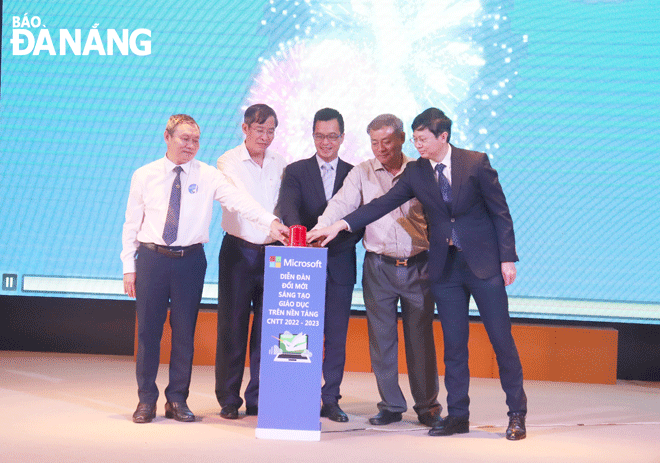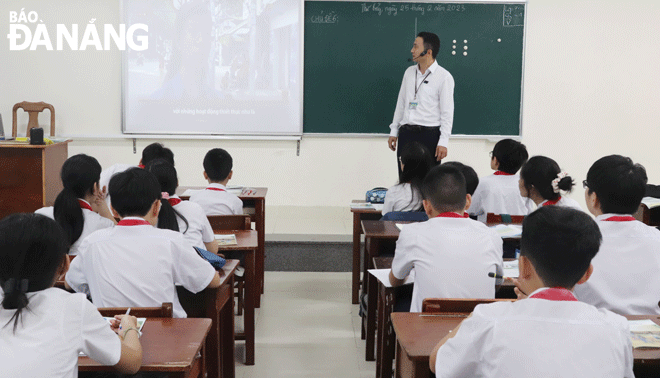Da Nang works to boost digital transformation in education
In their annual plan and development strategy for each stage, educational institutions across Da Nang pay special attention to applying information technology to serve administrative, teaching-learning and scientific research activities. This is also the appropriate direction when education and training is one of the priority fields in the Prime Minister-approved National Digital Transformation Programme to 2025, with a vision to 2030.
 |
| Da Nang's education sector responds to digital transformation at the Forum on Education Innovation on Information Technology Platforms organised by the Ministry of Education and Training in collaboration with Microsoft in Da Nang. Photo: NGOC HA |
Changes in teaching and learning process
In recent years, e-learning lectures or e-learning lesson plans have become familiar to teachers. Recalling the first days of getting used to e-lesson plans, Mrs. Nguyen Thi Hong Luyen, a teacher at the Hoa Bac Primary School based in Hoa Vang District, said that there were still many difficulties. Each teacher learns how to design and build such lessons, from application software to how to organize content and accompanying exercises to make it most vivid.
“So far, digital transformation is gradually appearing in educational institutions. Most teachers know how to build lessons and topics that apply technology to refresh their lectures such as Plicker, Classpoint, Canva, QR code, and interactive videos. In addition, the upgrade of facilities and teaching equipment at schools also create conditions for teachers and students to experience advanced and modern technology, thereby meeting the needs of comprehensive educational innovation" she added.
According to the municipal Department of Education and Training, a municipal-level e-learning lesson design contest is organised every year. Prize winning e-learning lessons are posted to the digital learning resource repository for teachers and students to refer to, especially lectures in the programmé and textbooks that have contributed to enriching the digital learning resource repository of the General Education programme 2018.
In addition to innovating teaching methods, up to now, senior high schools have used e-grade book, education universalisation, score calculation, online admission, accounting, and e-lesson design software. Meanwhile, the nutrition software has been used effectively in preschools.
Notably, schools' websites and fanpages have been created, with content updated regularly, promptly and richly. There are currently more than 180 educational institutions, with about 280,000 students, teachers, and university lecturers assigned identification codes and updated on the industry database system.
Mrs. Le Thi Bich Thuan, Director of the municipal Department of Education and Training, said that the city's education sector always identified digital transformation as one of its key tasks. She highlighted that building digital databases and applying information technology in teaching, assessment, testing and management helped improve the quality of teaching and learning.
 |
| Applying information technology to lesson design has increased pupils' interest. IN PHOTO: A lesson for pupils at the Nguyen Hue Junior High School based in Hai Chau District. Photo: NGOC HA |
Universities adapt to digital transformation
At the university level, member schools of the University of Da Nang have enhanced the application of information technology to maintain continuity and adaptation of training activities in new conditions.
Most subjects and lectures are compiled with content that can be taught both online and onsite. Some subjects can refer to or use learning resources and documents from advanced universities in the world.
Many universities have opened new majors related to the digital era to meet students’ demands and the inevitable trend of digital transformation in the fourth industrial revolution (Industry 4.0).
For instance, the Viet Nam - Korea University of Technology, Information and Communications open many new disciplines such as Artificial Intelligence, Digital Art Design, Computer Engineering Technology and Electronics, Tourism Service Management And Digital Travel (E-Tourism), and Logistics Management And Digital Supply Chain (E-Logistics).
It also opens the Digital Science and Technology Institute (eSTI) to research data science and artificial intelligence, smart technology and digital transformation.
Similarly, the University of Technical Education has approved some new undergraduate majors in order to improve capacity and train human resources for digital transformation.
In particular, the university has set up the Department of Digital Technology, aiming to foster a team of highly qualified engineers, strengthen cooperation with businesses, and deploy research projects to promptly meet the needs of the Industry 4.0.
Meanwhile, the University of Economics opens new majors in Digital Marketing, E-Commerce, Data Science and Business Analysis, Digital Travel and Tourism Service Management, and Logistics Management and Digital Supply Chain.
In addition, the University of Science and Technology has recently established departments of Data Science and Ai, Control Engineering and Automation, and Electronics and Telecommunications Engineering. It is expected to announce the IC technology training programme in the fourth quarter of 2023.
According to Associate Professor, PhD. Le Quang Son, Deputy Director of the University of Da Nang, digital transformation is the driving force for development, and a new direction to improve the quality of training and scientific research. Therefore, the University of Da Nang has proactively promoted digital transformation with a focus on 3 "pillars": high-quality human resource training, the application of information technology (IT) in digital transformation, and innovating university administration.
For scientific research and innovation in digital transformation, the unit currently has research - teaching groups (TRT) actively operating in the fields of IoT, AI, Cloud Computing/Communications, and Big Data.
In the coming time, the university will continue to promote digital transformation in the fields of training, scientific research and university administration.
Heed will be on completing the platform and technical infrastructure to ensure conditions for digital transformation; as well as promoting the connection of expert consulting and research networks so that domestic and international scientists can connect with localities and businesses to participate in solving urgent and topical issues.
Reporting by NGOC HA - Translating by M.DUNG